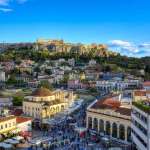Travellers have been visiting Athens since antiquity. When most of Europe or Asia was suffering, Athens often remained a prosperous city due to its location for trade. The city has gotten quite a facelift in the last decades by cleaning up the air pollution, modernizing the city’s infrastructure and improving social amenities. This revamp was essential when Athens put in a successful bid to host the 2004 Olympic Games. If you go outside the tourist areas you’ll find that Athens today is a mix of modern and technology, and the old grim city hiding little gems tucked in amongst the urban decay.
The Acropolis – the eternal symbol of democracy, education and inspiration – dominates the Athenian sky. The areas at the foot of the Acropolis, Anafiotika, Plaka, Monastiraki and Thissio are home to many wonderful Neo classical buildings, ancient temples, little Greek Orthodox churches, plus many trendy and traditional cafes and shops.
History of Athens:
Athens is one of the oldest named cities in the world, having been continuously inhabited for at least 7000 years. By 1400 BC the settlement had become an important center of the Mycenaean civilization. Artefact finds confirm that around 900 BC onwards Athens was one of the leading centers of trade and prosperity in the region.

By the 6th century BC, social unrest had become widespread, and the Areopagus appointed Draco to draft a strict new law code. When this failed, they appointed Solon, with a mandate to create a new constitution in 594. This was the great beginning of a new social revolution, which was the result of the democracy under Clisthenes in 508 BC. The decades that followed became known as the Golden Age of Athenian democracy, during which time Athens became the leading city of Ancient Greece, with its cultural achievements laying the foundations of Western civilization. Playwrights, historians, physicians and philosophers all lived and worked in Athens during this time. The monuments on the Acropolis were constructed.
The Greek peninsula came under Roman rule in 146 BC but Athens operated as a free city. Greece came under the influence of Early Christianity and Athens was prosperous during the Crusades. During the early Middle Ages the city experienced a decline but then recovered under the later Byzantine Empire. In 1458 Athens was conquered by the Ottoman Empire and entered a long period of decline. The Greek revolution began in 1821 and lasted until 1833 when the Ottomans finally withdrew. Greece won its independence and Athens was chosen as the capital in 1834. Once the capital was established, a modern city plan was laid out and public buildings were erected. In 1896 Athens hosted the first modern Olympic Games. Athens was occupied by the Germans during World War II and experienced terrible privations during the later years of the war.
By the early 1980s Athens had some of the worst traffic congestion and air pollution in the world at that time. A series of anti-pollution measures taken in the 1990s, combined with an improvement of the city’s infrastructure won Athens right to host the 2004 Summer Olympics.
View All Tours View Luxury Cruises View Unique Journey’s View Private Adventures View Custom Groups











